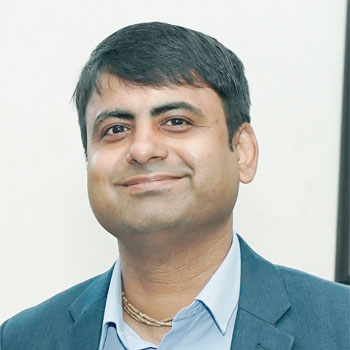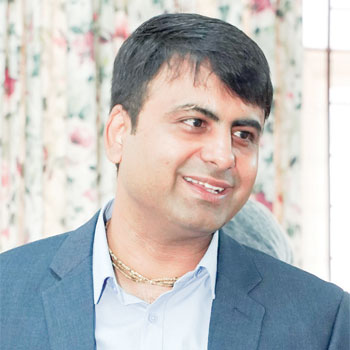Plan, Coordinate, Control

Experienced project development specialist with a demonstrated history of working in the real estate industry, Abhay Tiwari, Director - Work Dynamics, JLL, is skilled in people management, career management, risk management, construction drawings and Engineering, Procurement and Construction (EPC). In tête-à-tête with Corporate Citizen, he takes us through his career journey, experience, real estate industry, project and risk management and much more
Corporate Citizen: Tell us about yourself and your educational journey.
Abhay Tiwari: I have my roots in Bihar, and my parents are from a place called Buxar, famous for the Battle of Buxar, and a "strong fortified town" within the territory of Bihar, located on the banks of the Ganges river. My uncle migrated to Pune, as he got an opportunity to work with the Tata Motors here, which was at that time known as Tata Engineering and Locomotive Company (TELCO). My father came with my uncle to Pune and completed his Bachelor of Science in Engineering (BSE) from College of Engineering, Pune (CoEP). My uncle later joined Bharat Petroleum and moved out of Pune, while my father stayed on in Pune. I was born and brought up in Pune.
I did my diploma in civil engineering from Pimpri Chinchwad Education Trust (PCET), and later pursued Bachelor of Engineering (BE) from JSPM Rajarshi Shahu College of Engineering. For my post-graduation, I chose advanced construction management programme from National Institute of Construction Management and Research (NICMAR).
CC: You started as an executive engineer with KazStroy India, in 2009. How has your early career choices shaped your career?

I started my journey as a management trainee and executive engineer at KazStroy Engineering India Pvt. Ltd., a real estate builders and construction company in Gurgaon, Haryana, where I worked for around four years. However, when my mother fell ill, she wanted me to be back in Pune. I came back here and joined a company called Fabtech Projects and Engineers Ltd., a leading provider of Engineering, Procurement, Construction (EPC) services to the oil and gas, chemical and sugar industries, where I worked as an assistant manager-projects. Fabtech was establishing the project controls department; I worked with them in key infrastructure projects, among which one was the oil and gas pipeline. Unfortunately, due to farmers’ protest in Karnataka and Tamil Nadu, that got shelved. While posted at Indian Oil Corporation Limited (IOCL) Jaipur Terminal, there was one big fire, in which property worth Rs.400-500 crores, the entire tank, got wiped out in flames. The M.B. Lal Committee was established to investigate the fire and explosion, leading to 118 recommendations to improve safety in the oil and gas industry and prevent similar incidents pan India. After that, I was working with Oil India Limited in Assam, for fulfilling the recommendations of the M.B. Lal Committee, in seven locations within the state.
Once the Oil India project was over, I got an opportunity to work in Knight Frank India, a real estate consultancy services company, as a manager - contracts. The company had bagged a project for Mercedes-Benz in Chakan. It was a 15 lakh sq. ft. project, which was to be completed in 10 months. That intrigued my interest, since it did not seem practical to complete a 15 lakh sq. ft. project, in such a small deadline. Hence, I decided to join and see how it was being done. I was stationed at that project, and Shapoorji Pallonji Group, a global diversified organisation that delivers endto-end solutions in engineering, construction and infrastructure, assigned the project, the value of which was around Rs. 300 crores. And, in fact, they managed to complete the project in 10 months. That was a big time experience for me. Following that assignment, I was directed to lead operations in the north-eastern region, overseeing radio broadcasting initiatives. However, due to personal circumstances, I was reluctant to relocate at that time. And, I joined JLL as a project manager.
In JLL, I have grown from project manager to senior project manager to director, in a span of eight years. With JLL, I have been working on multiple projects and been a keen believer in sustainability, which is also one of the key focus areas of JLL. So, that led me to do a lot of green certifications. I am also associated with Confederation of Indian Industry (CII) for the sustainability. I am representing JLL in the APAC region on the internal sustainability platform.
CC: Your role as a project management specialist involves what responsibilities, and what is the nature of your work?
At JLL, we do it in a five-step process of a project life cycle: Initiate, Plan, Design, Construct and Closure. We talk about the Project Scope— determining and documenting project goals, deliverables, tasks, costs and deadlines. But, the challenges we face are many. For example, the first thing is to understand the scope and the client expectation. Sometimes, the client expectations are entirely different from what’s written on the papers. So, understanding client expectations is very important. Second is, understanding the time constraint. Say for example, we take up a government project and the deadline for the project is a specific date, then that deadline is automatically passed on to me. I will be required to complete the project before that specific deadline, or people involved in that project will lose jobs or there will be no job creation or no project at all.
Next is the budget, which is always a constraint. No client in the world will come with a hefty packet full of money or will give you a blank cheque, for the project. Then comes the statutory constraints—if you do not get approval from the Government in a timely manner, sometimes projects can get scrapped or delayed. That’s a major constraint in industrial projects specifically.
In India, we have seen significant improvements in its "Ease of Doing Business", but they are still miles to go on the expectations of the international companies, which are coming to India. It is because, there the processes and regulations are very different. It’s mostly on selfcertification basis there, and you don’t need an approval from any government bodies. These challenges become the biggest constraint to the ease of doing business in India.
The next challenge is to get a good vendor partner. Even if the vendor partner is not good or not supportive, you cannot leave him. Getting a good design partner, an architect, an execution partner, is very crucial.
As time progresses, the project scope keeps on increasing. As time increases, scope increases, and the budget also increases. But, if you are not able to define project’s scope of work accurately and have actionable strategies, then it becomes a challenge.
CC: Your project management skills when it comes to tackling problems—did you acquire these through books or through realtime experiences?
It’s the combination of both. I’ll not say that I didn’t learn anything from books. People meet me and tell me its all theory. But, according to me, it's not just about theory. You are the one who has to implemented these theories into practice—that gap is very minimal for project management.
The next part is the skill set a person needs to successfully do a project. When we were in NICMAR, we were called techno-commercial managers. I didn’t understand its meaning until few years back. Techno-commercial manager means, a person who has a technical background with a managerial capability to execute construction projects. That’s the basic.
However, if I am doing project management, I am not going to physically carry bricks and mortar, and do the work. Rather, I will instruct somebody. So, communication is very crucial in that. Major percentage of time, the project manager communicates—he is either communicating with clients, with other agencies, contractors or his team. He is always communicating and that skill is paramount.
Talking about people management, that skill comes into picture when you have to understand whether your team member has understood what you have communicated, and if he is acting upon it or not. And, if he is not acting upon it, what are you doing to make him act upon it. But again, in project management, communication is the key.
CC: Understanding and adapting to the new organisation's culture is crucial for a smooth transition and long-term success. What were the challenges you faced while transitioning from one industry to other, in your 16+ years of career journey?
Culturally, the companies I worked at till now, were different. And, I have also moved from one sector to another, during my transition. I have gone from a contracting firm in oil and gas to a service based firm into project management. Today, I instruct people on the other side of the table to get the work done, but ten years back, I was the one on the other side of the table getting instructed by the project manager. So, that has helped me evolve. I can understand the pain of the employees, such as, he or she might not be getting support from the management, or the procurement person may be taking some time due to some reasons, etc. So, I can understand-I can empathise with them and support them. As I moved from one organisation to another, I acclimatised myself to changing work culture and aligned my own approach to work accordingly
CC: In proje ct management, you have to constantly update and rescale yourself over time, but does that apply when you change from one sector to another?
When I shifted from a contracting firm to a project management firm, that was the phase when my boss used to tell me, “Stop thinking like a contractor. Professionally, you are a project manager—you need to think like a project manager.” The mindset change takes time. The juggling of the client mindset, contractor mindset takes some time, and that transition is painful.
I never used to delegate things, because at a contractor’s firm, it’s more like a one-man show. You are responsible for your own project. But for project management, you have to have a team. Mr. X will look into the technical challenge, Mr. Y will talk to the client regarding a commercial challenge, and Mr. Z will resolve the quality challenge and get things done. So, team building and the team euphoria or team cohesiveness is much more into project management, as compared to the contracting sector. In contracting sector, you are a goal-driven person and you are required to complete the project. In project management, it is the client expectations and other things that are to be done in phases—it’s like breaking a project into tasks and phases.
"If you don’t know anything about a particular project or domain, hire the best people you can, for that. And, I always ask my team, “what else do you need from me?” It’s like, either you get the knowledge for a particular project or you support the people who have the knowledge "
One of my favourite quotes which I tell people is from the Game of Thrones, drama series - “One game at a time”. You cannot have everything at once. Another thing which I was taught when I was in NICMAR, is the Swiss Cheese Technique— you have a bowl of cheese, and you eat it by slicing it into pieces
So, one thing which I have learned is the risk management based approach for project management. It’s like, if I’m doing X thing, what are the things that can go wrong? For example, if I’m building a concrete of say, 100 metres, what can go wrong? My pump can fail. My person who is working there may fall ill. My plant from where the concrete is coming may breakdown. The vehicle may have an accident. The site may not be ready. Now, you tackle each of these challenges. Like, if you are not sure about the pump quality, change it before the activity or get a spare pump. I personally call it, a risk management based approach. It has different connotations in the industry. Some call it pre-mortem way of working. And, if those things have happened earlier, it’s not a risk anymore; it’s a fact. So, risk is uncertainty basically, and then comes the role of your contingency plans. The only thing is that, it should not hamper the critical path of your project. If it hampers your critical path - What is your contingency plan? What is your catch up plan for that?
CC: What are the skills you need to succeed as a project manager?
Project management can be applied anywhere. It’s not like you are looking only after construction project or IT project. Projects can be anywhere. It can be a financial project or even a HR project. But, one thing you need to understand is, the end goal. What is the end goal?

In the corporate world, there are certain expectations. Understanding the expectations of internal and external stakeholders is very crucial. Next is, communication— with your stakeholders and team members. Effective business communication involves clarity, correctness and conciseness in what you communicate.
Next is, if you don’t know anything about a particular project or domain, hire the best people you can, for that. And, I always ask my team, “what else do you need from me?” It’s like, either you get the knowledge for a particular project or you support the people who have the knowledge.
People have different needs. If you ask me, I thrive on praise - that’s something which I require and that motivates me. People who are introverts may not speak in the meetings. You will always get a mix of people in your team. And, I really believe that the boss should speak last and the junior-most person should speak first. Because, if the boss is saying something, one will find ways and means to defend that, and he or she will go in a different direction. So, the junior-most person should speak first, and the senior-most person should speak last. So, you should understand each and everybody’s perspective, and here is where, soft skills or management skills become a crucial part.
Lastly, what I call is technical skills or a domain specific skills—for example, if I am doing an HR project, and I am a seasoned project manager, I should be aware of the processes involved in it. I may not know how to cook a mix vegetable dish, but I know that I should understand what is the process of cooking. That should be there.